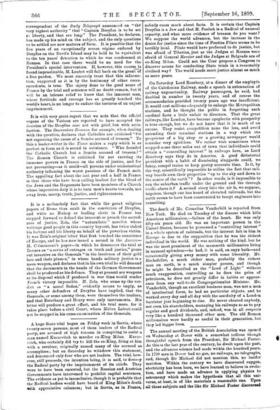It is a melancholy fact that while the great religious
papers of Rome thus exult in the conviction of Dreyfus, and while no Bishop or leading cleric in France has stepped forward to defend the innocent or preach the sacred- ness of justice, Zola, the "naturalistic" novelist whose writings good people in this country boycott, has twice risked his fortune and his liberty on behalf of the powerless victim. It was Zola's original letter that first touched the conscience of Europe, and he has now issued a second in the Aurore- M. paper—in which he denounces the trial at Rennes as " a series of outrages on truth and justice," pours out invective on the Generals "in the insolence of their gold lace and their plumes," in whose hands military justice is a mere weapon, and declares that in his own trial he will demand that the documents in the hands of the German Government shall be produced as his defence. They at present are weapons at its disposal which if produced in war time would render French victory impossible. M. Zola, who sums up the ver- dict as " a moral Sedan," evidently means to imply, as many other defenders of Dreyfus have implied, that the Generals, or some among them, were themselves the traitors, and that Esterhazy and Henry were only instruments. His letter will produce a great effect, and his trial more, for it takes place before a civil Court, where Maitre Labori could not be stopped in his cross-examination of the Generals.


































 Previous page
Previous page